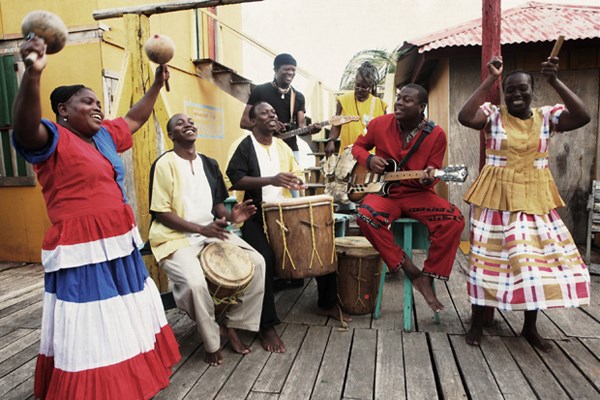Interview with Garifuna Collectives Desiree Diego originally published July 17, 2009 prior to performances by Umalali at that years Vancouver Folk Music Festival.
Even though its been mostly men who have traditionally performed Garifuna music in public producer Ivan Duran says it is the women who are the cultural anchors.
"Yes we are," agrees Desiree Diego, a member of Umalali, The Garifuna Women's Project ensemble set to perform Sunday at the Vancouver Folk Music Festival. "Women are the writers and composers of most of the songs sung by men. The men take the songs to the stage but women are the backbone."
Duran, one of the people responsible for the emergence of Garifuna music on the international scene, started researching the women's contribution to music more than a decade ago. In tandem with the late Andy Palacio he set up The Garifuna Collective, a multi-generational group of musicians from Belize and Honduras, to investigate all things Garifuna. A few women, including Diego, were used as backup singers on the sessions but considering how important they were to music creation it must have been surprising to Duran how few women were available to perform it. They were busy doing other things.
Even before he had any idea of what he would do with the material Duran began recording women singing in natural settings kitchens, living rooms, in the streets or in the Garifuna temples, usually documenting voices that had never been recorded before. Like Alan Lomax did in the American South, Duran was documenting an unknown sonic world.
In 2002 he began formally recording Umalali The Garifuna Women's Project in a thatched-roof studio set up on the beach in Hopkins, Belize. The recording process took a long time as the women singers had to find time to record around their other jobs and chores. After the initial sessions were completed Duran added more instrumental layers with players from The Garifuna Collective. The result, released in 2008 to worldwide acclaim, brings the contributions of women into focus for the first time.
Desiree Diego had never seen a microphone before she went into a studio in 1995 to record backup vocals on Palacio's Keimoun album. "I was always singing but not with microphones and headphones and guitars and all these instruments added on. For me I was surprised and a bit frightened just to put the headphones on my head it was like Hey, what am I doing here? But at the time he explained to us you just put the headphones on your head and then you hear the music and youll know when to come in with your vocals. I started learning at that point."
Diego is known throughout Garifuna communities in Belize as a Dugu ceremonial singer. "I was born and raised in the beautiful district of Dangriga," she says. "I started singing at the age of 13 in the temple. The thing is my parents sang a lot, my father mostly though. They wouldnt sing in the temple but they would sing at home.
"At the age of 13 I went to visit my godmother who was the high priest in the temple. She took me inside and that night I couldnt sleep. The songs came to me one after the other and I went back in the morning and I said to her, Godmother I couldnt sleep and this is what happened. So I asked her if I could sing a couple of songs in the temple that day. She said yes and asked the older folks to give me a little break and thats where I started."
Diego speaks English but at home in Belize Garifuna is the main language spoken. "Garifuna from Guatemala and Honduras speak Spanish as a second language. Miss Sophia and Miss Marcela (the other women on the Umalali tour) speak Spanish, says Diego. The rest of us speak English."
Traditional Garifuna music has been passed on by elders to younger musicians as oral literature for centuries. For the older folks pen and paper wasnt much of their thing, says Diego. It is amazing how they do it because they tend to not forget what they have sung or what they have got from their dreams. Music was taught during working or just having a good time. It was easier to learn that way than to put it down with pen and paper.
The Garifuna Women's Project began recording tracks for a new album three weeks ago at Duran's Stonetree Records studio in Benque Viejo, Belize. "We are recording another album right now with Lloyd Augustine who did a couple of songs on Watina," says Diego. "Immediately after this tour we will be heading into the studio to do some more."



